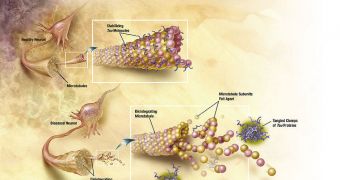An international collaboration of researchers has determined that much more emphasis should be placed on detecting Alzheimer's disease during its earliest stages. At that time, the experts say, certain therapies can be a lot more effective than they are at later stages.
The researchers, who are based at the dedicated organization Alzheimer’s Disease International (ADI), say that early diagnostics, timely interventions and advanced preemptive actions should all be considered as possible options to stop the diseases' progress dead in its tracks.
Alzheimer's is an incurable, terminal neurodegenerative disorder, a form of dementia that gradually affects memory and superior cognitive abilities. At this time, there are few promises that a cure capable of healing the brain damage the disease causes will be produced too soon.
As such, the most important thing people can do is to take preemptive actions, safeguarding themselves by putting their minds to work in solving mathematical problems, speaking foreign languages, learning new things, generally anything that gets their neurons working.
Additional health, financial and social benefits can be gained by visiting doctors regularly, and getting put through diagnostic paces. This is true for seniors over the age of 60, and especially so for those who have or had relatives that experienced signs of dementia themselves.
“There is no single way to close the treatment gap worldwide. What is clear is that every country needs a national dementia strategy that promotes early diagnosis and a continuum of care thereafter,” explains the leader of the new study, Martin Prince, MD.
“Primary care services, specialist diagnostic and treatment centers and community-based services all have a part to play, but to differing degrees depending upon resources,” adds the expert, who is based at the King's College London.
“Failure to diagnose Alzheimer’s in a timely manner represents a tragic missed opportunity to improve the quality of life for millions of people,” ADI chairman Dr. Daisy Acosta goes on to say, as quoted by PsychCentral.
In order to conduct the new study, investigators compile a comprehensive, systematic review of all evidence on early diagnosis and early intervention for various forms of dementia, including Parkinson's and Alzheimer's.
Even in the most developed countries, only 20 to 50 percent of dementia patients are diagnosed and treated for their condition. In other parts of the worlds, about 75 percent of the 36 million people suffering from this array of conditions never receive proper care.

 14 DAY TRIAL //
14 DAY TRIAL //